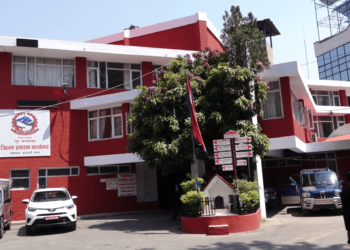KATHMANDU: A recent revelation on the kidney trafficking issue has shocked many when it’s found that a group of traffickers has been involved in trafficking the kidney of the patients in hospitals.
A group of traffickers has started the new way of trafficking the kidneys by creating fake relatives of the patients in the hospital. The Nidan Hospital’s incident has verified the skepticism regarding the false intent of the doctors and other staff and their role in the bargaining of the organs of the patients.
The shocking incident of October 16, as it took place in Nidan Hospital, Pulchowk, has revealed the irony that the patients are not safe in the hospital. There a stranger’s kidney was used for transplantation tempting him in many ways.
Shankar Lal Lama a chronic kidney victim from Doramba-3, Ramechhap was admitted for further treatment at Nidan Hospital. The diagnosis there led to the conclusion that he had to go through transplantation.
As a prospective donor, a nephew on sister’s line was presented to the team. However, it was discovered that he was ‘the donor in the document’ only, the real donor was one of the patients in the hospital.
The kin in the document was only to avoid legal formalities, the incident was mummed for the time being; however, when police got the information about such conduct and initiated the probe in the matter, the horrible incident to the light, says Govinda Thapaliya, Superintendent of Police (SP) at the Human Trafficking Investigation Bureau.
The police arrested five suspects of the incident after the revelation was made.
Bipendra Pradhan, the chief executive officer of the hospital, Shankar Lal Lama, the kidney patient, Kumud Kumar Bhattarai, the legal officer of Nidan Hospital, Dr. Rajesh Pant and Ram Chandra Ale, a Section Officer of DAO, Lalitpur were arrested.
Although the police have not revealed the name of the victim, it is found that the hospital had tempted the victim promising Rs 3 lakhs. According to SP Thapaliya, a case has been filed against them as per the prevailing Human Trade and Trafficking Act 2064.
As per the Act, the persons found guilty in human organ trafficking have to face ten year’s imprisonment along with Rs 2 lakhs to 5 lakhs as fine.
This is merely a representative incident in kidney trafficking. According to Nepal Police, the incidents of kidney trafficking hail from 2050 BS. Although the police does not have formal statistics of the incidents before, nine such incidents have become public since 2067/68.
“Despite Nepal Police’s attempt to control such criminal activities,” says Bishwo Raj Pokharel, the Spokesperson of Nepal Police, “we have come across nine such cases out of which fifty percent cases reveal the role-play of fake relatives.”
How is trafficking executed?
Clause 14, Part 3 (A) of the prevalent Human Organ Transplantation Regulation and Prohibition Act, 2055 has the provision permitting the healthy relatives to donate kidney to the patient.
The police investigation has found out that the traffickers have been abusing the provision and getting the strangers as the fake relatives for the purpose of donation.
Experts in the issue claim that the kidney trafficking of Nepalese have been worse in India than in Nepal. Taking advantage of the open border between India and Nepal, many poor and ignorant people are tempted with the lucrative sum and taken to India for the purpose.
“The traffickers bargain with the kidney patient’s relatives and once the deal is settled they send the blood group and other details of the patients to the traffickers of Nepal, and the team in Nepal identifies the target in Nepal,” says Keshav Adhikari, former DIG of Nepal Police.
According to Adhikari, the targets of such traffickers are often the poor, illiterate and ignorant people struggling for their life in Nepal.
Once the target is identified they start tempting the prospective donor and start preparing documents for the fake relatives. Once such fake details are prepared the members of the trafficking gang reach the Ministry of Health for further process.
According to the experts, such members are always in league with some of the officers in the ministry who help them prepare such documents. Mostly, the kidneys are managed from the poor and sold to the rich offering nearly ten times bigger sum to the traffickers.
First victim, then the plotters for trafficking
Although the police do not have the actual data of the ‘kidney sellers’, the history of such trafficking has been more than two-decades-long.
The Maharajganj Unit of Metropolitan Police had arrested 10 persons involved in such activities in 2071 BS. The police arrested them when it got the information that two victims from Kavre were being prepared for such trade, both of them were promised a ‘lucrative sum’.
According to spokesperson Pokhrel, two out of ten traffickers had taken one more person to India in 2067. The other five had sold their own kidneys before, prior to joining the league of such traffickers. “First they sold their own kidneys, then, once they returned from India, they made trafficking their profession,” says Pokhrel.
“Such victims, due to their close connection with the traffickers tend to adopt trafficking as a profession,” adds Adhikari, former DIG, who is well-acquainted with such cases.
According to the data at Nepal Police, Hokse Village Development Committee alone is populated with more than 150 such ‘victims’.
How to curb it?
“Human organ trade and trafficking itself is an illegal act,” states spokesperson Pokhrel, “hence, no person involved in such activities shall be spared.”
“The police have taken initiation to curb such illegal activities, added Pokharel. “However, it can be successful only when the people themselves become conscious and concerned about such fatal activities.”
The effective public awareness about the prevailing laws, the systematic record of the people involved in trafficking and their know-how are few measures to be initiated instantly, opines Adhikari.
He believes it possible provided everyone becomes conscious and cooperative in the effective implementation of the laws meant to curb such activities.









Comment